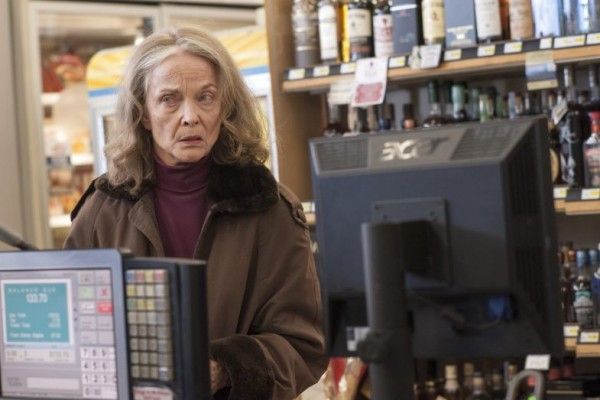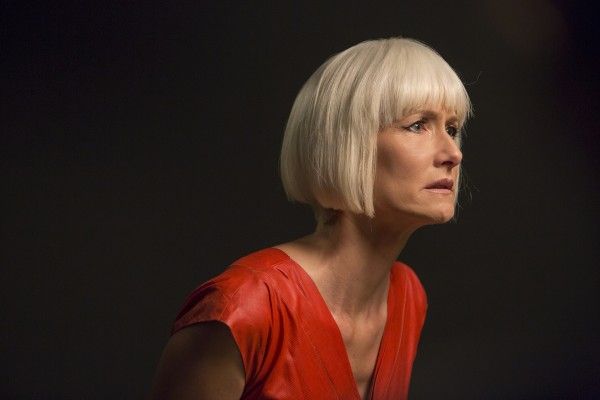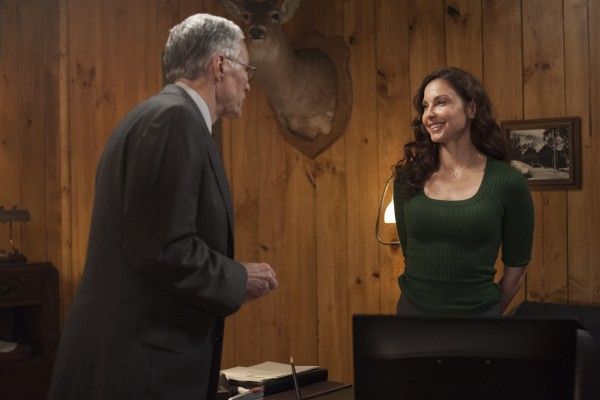There was a lot of talking in "Part 12" of Twin Peaks: The Return. As the episode opened, Albert was laying out the background for the governmental extraterrestrial agency called Blue Book which eventually became the Blue Rose Task Force, the original member of which included Dale Cooper, Philip Jefferies (David Bowie), and Chester Desmond (Chris Isaak), amongst a select group of others. Now, Albert and Gordon want to make Tammy an official member, an honor she is ecstatic to receive, and they deputize Diane in the hopes that her warmth for Cooper will drive her. It's unclear if that's a foolish assumption.
A good portion of the exchanges that made up "Part 12" involved negotiating the sharing of secrets with someone else. In the case of Tammy, she's happy to have the responsibility of the knowledge and Albert and Gordon are happy to be trusting her with that information. That's less the case with Sheriff Truman and Ben Horne, wherein Truman informed Ben that his grandson, Richard, killed a child and attempted to kill the only clear witness to the incident. There's a palpable intimacy between these men, one that goes unexplained but is quickly established by the actors' tone and body language. Ben appreciates Truman coming to him to privately talk to him about the situation and gives him Cooper's key in return. For Truman, being able to relate personally with the locals pays off with information that ties into the nationwide rift brought on by the two Coopers.
Indeed, for a show that has often been dismissed as incomprehensible, the message of Lynch's latest episode seemed to be both simple and timely: be kind. When he's told about his tenant selling blood for rent and food, despite the tenant helping out around the trailer park and around town in general, he makes a point of forgiving his rent for the month and handing him forty bucks for food. Carl sees the work and talent that his tenant gives and asks nothing in return for, and decides to put fair value to that work in the name of his friend not literally having to give his blood to make ends meet.
This could even be seen in Gordon's interrupted date with the French lady, whose entire routine before leaving for the hotel bar works as a symbol for Lynch's particular way of working and leaving an impression. When the lady leaves, Albert shares Diane's messages to an unknown other, the same one she communicated with at the morgue, but Gordon quickly sees beyond the implications of Diane's messages and toward the well-being of his friend and colleague A few episodes back, Gordon and Tammy were laughing giddily at the sight of Albert having a dinner date with Jane Adams' hard-edged detective. That same hope can be seen in Lynch's eyes when he talks to Albert about his concerns for his personal well-being and social life, especially when they are so easily eclipsed by work.
A more complicated show of care came from our first resonant sequence with Grace Zabriskie's Sarah Palmer. Mrs. Palmer has gone so far inside herself at this point that the slightest anomaly in her routine can set her off, and that's just what happens when the sight of a Turkey Jerky display triggers her in the midst of her re-upping her supplies of vodka, Bloody Mary mix, and smokes. (Admittedly, part of me wondered if the Turkey Jerky vs. Beef Jerky scene was a knowing prod against those who are waiting for this season to finally align with the first two seasons.) Still, for whatever the awkwardness of Mrs. Palmer's outburst, the bag boy offers to run her groceries over to her house and later on, Hawk comes by to make sure she's doing okay, all things considered.
The importance of intimacy in communicating unexpected, occasionally tragic events to others and being prepared to handle the aftermath is most evident in the scene where there seemed to be the least amount of quiet understanding between the two speakers. Thankfully, the conversation also happened to be the first scene of the season thus far to include Sherilyn Fenn's Audrey Horne railing against her "very tired" journalist husband (Clark Middleton). While hubby keeps using his work as an excuse, Audrey threatens him with total abandonment and severing of their "contract" if he doesn't help her find the unseen Billy. And when the husband receives secretive information during a phone call, he withholds it indefinitely, despite Audrey's debasements.
Even in this scene, Lynch finds a casual, hard-to-fake rhythm between the characters, a sense of familiarity that goes beyond preconceived dramatic structure. If one were to ignore this engrained, off-kilter comfort, built into compositions as much as the performances, these exchanges felt like the narrative getting us back up to speed while advancing the search for Cooper in both Twin Peaks and with the members of the Blue Rose Task Force. For all the interconnecting parts of Lynch's gloriously unwieldy plot, it's in his rapturously askew moods and attention to personal rituals and peccadillos, such as the French woman's exit routine, that continues to make Twin Peaks: The Return such a riveting joy to watch. Without it, you'd think Dr. Amp was just trying to sell you spray-painted shit-digging shovel rather than a way out of the daily belittlement that those in charge seem to run on.
Rating: ★★★★






